Ocean.io Alternatives
Explore 10 alternatives to Ocean.io. This guide provides a detailed comparison of features, pricing, and use cases to inform your decision.
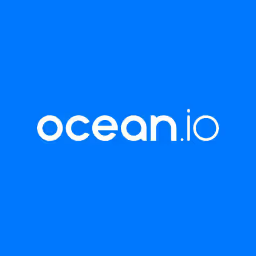
You might be using Ocean.io for good reasons. It’s a solid choice for B2B lead generation, especially with its AI-powered lookalike search. The tool helps you find new prospects that are similar to your best customers, which is effective.
But like any tool, it has limits. Some users mention occasional data quality issues, its price, and export limitations. We've identified the best alternatives and analyzed them based on G2 reviews to help you shortlist options for a deeper review. Let's get started.
Consider 11x Digital Workers
For teams exploring digital workers for sales, 11x offers a different path. Their autonomous agents handle lead generation and outreach, which could be a fit for your specific operational goals.
This approach focuses on augmenting your current sales operations with automation. It's a relevant option if you are looking to build your pipeline through autonomous means.
11x is a go-to-market platform that uses AI agents to automate the sales process. It handles the entire workflow, from finding prospects to outreach.
An agent named Alice finds prospects, runs outreach on email and LinkedIn, and updates your CRM. Julian, another agent, qualifies inbound leads and books meetings.
The platform unifies data enrichment, outreach, and email warmup tools. This can replace several separate solutions in a traditional GTM stack.
Ocean.io Alternatives
Here, we analyze the top Ocean.io alternatives. Each option is broken down by its main features, pricing, and its specific advantages and drawbacks compared to Ocean.io.
1) ZoomInfo SalesOS
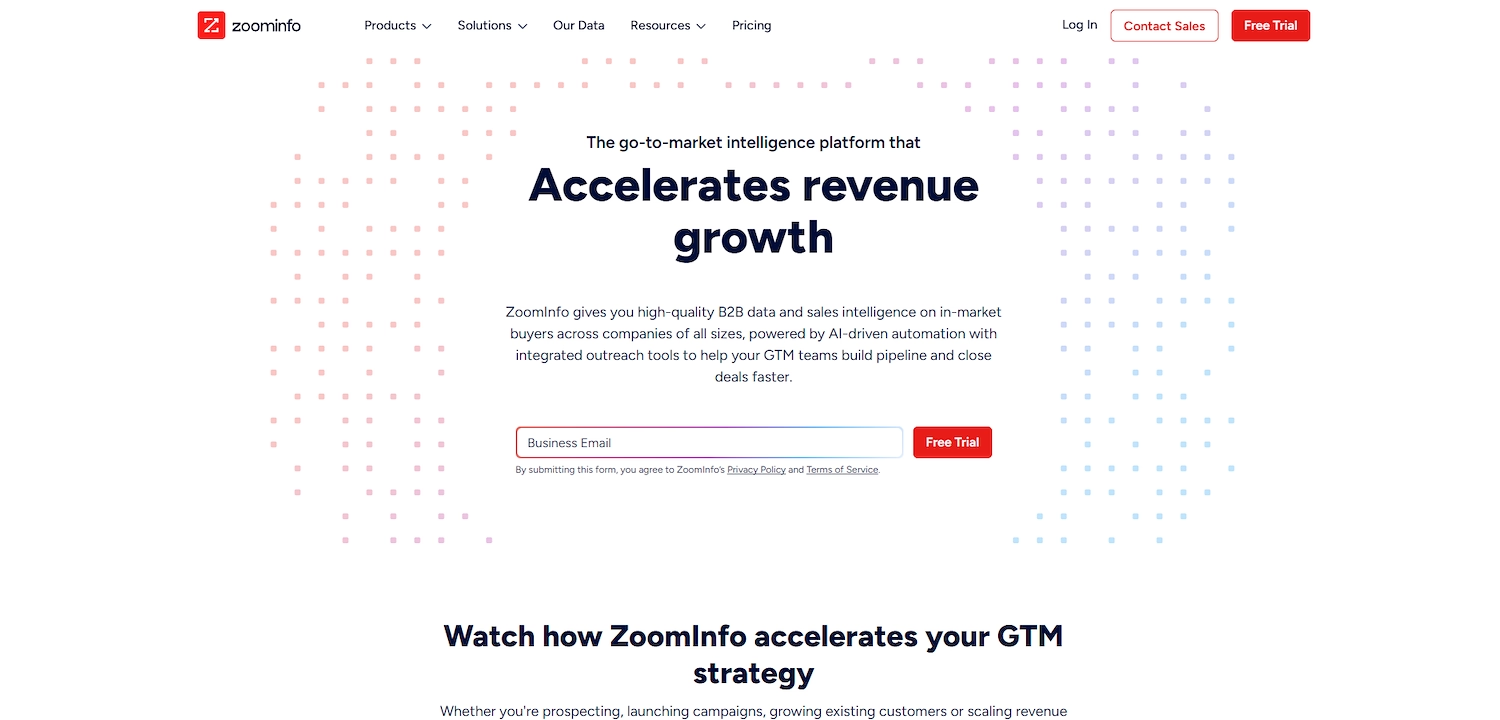
ZoomInfo SalesOS is a go-to-market intelligence platform. It helps B2B organizations find and connect with buyers. The platform combines contact and company data with buyer-intent signals and engagement tools into a single system. It serves as one source of information for sales, marketing, and operations teams. Common uses are to build prospect lists with verified contact data and to identify accounts that are ready to buy.
ZoomInfo SalesOS's Main Features
- Analyzes call and meeting interactions with its conversation intelligence feature, Chorus.
- Uses a generative-AI companion, Copilot, to surface insights and draft outreach.
- Identifies anonymous website visitors and turns page views into sales pipeline.
- Triggers go-to-market activities automatically through workflows and enriches CRM data in real time.
How ZoomInfo SalesOS Compares to Ocean.io
Average Review score: 4.5/5 stars based on 8,738 G2 reviews.
- ZoomInfo SalesOS provides a larger and more frequently updated database compared to Ocean.io. This results in more accurate contact information and fewer outdated leads.
- It includes a conversation intelligence tool, Chorus, to analyze sales calls and meetings. This feature, which Ocean.io does not offer, provides insights into customer interactions.
- The platform features an AI companion, Copilot, that drafts outreach and suggests who to contact. This is different from Ocean.io's AI, which focuses on its lookalike search.
- This tool can identify anonymous website visitors and turn them into potential leads. Ocean.io's platform concentrates more on outbound prospecting rather than inbound lead capture.
Drawbacks Compared to Ocean.io
- ZoomInfo SalesOS does not offer a direct equivalent to Ocean.io's AI-powered lookalike search. Ocean.io finds companies that resemble your best customers, while ZoomInfo's AI helps write outreach and suggests contacts from its database.
- The tool's extensive feature set can introduce complexity for some users. Teams may find the implementation process longer compared to Ocean.io's more specialized platform for account discovery.
- Its cost can be a considerable factor for some businesses. The platform's enterprise-level pricing is sometimes higher than what a team might pay for Ocean.io's focused prospecting capabilities.
Cost and Value Analysis
ZoomInfo SalesOS operates on a custom-quote model and is considered a premium-priced solution, reflecting its extensive database and features. While Ocean.io also lacks public pricing, user reviews indicate it is a significant investment that may be out of budget for smaller agencies. For exact costs, you will need to contact each vendor for a quote based on your needs.
2) Apollo.io
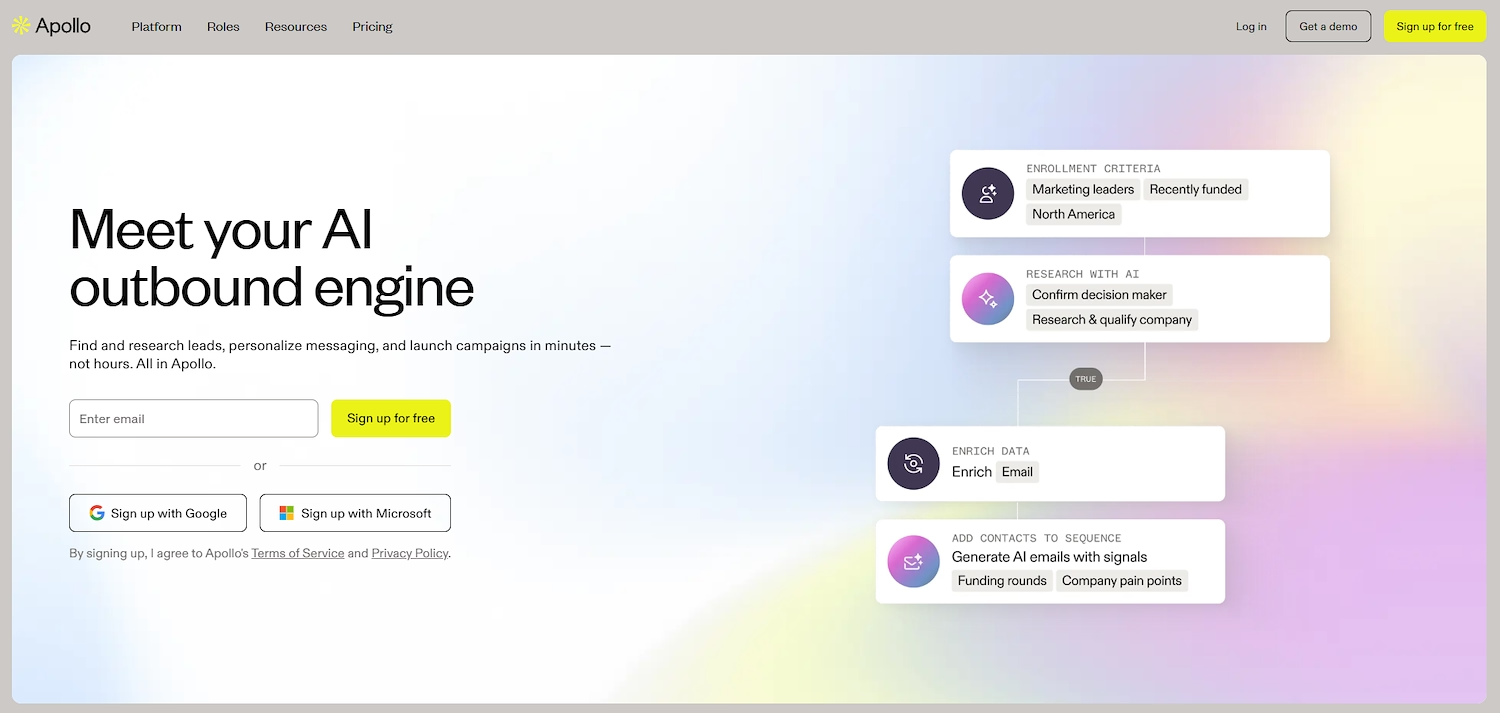
Apollo.io is a sales intelligence and engagement platform with an extensive B2B database. Go-to-market teams use it to find prospects, build targeted lists, and engage leads through automated email and call sequences. This combination of data and tools supports the entire sales process.
Apollo.io's Main Features
- Provides access to a B2B database with contact and company information.
- Builds targeted lists of prospects from its database.
- Engages leads with automated, multi-step email and call sequences.
- Combines a contact database with sales engagement tools in one platform.
How Apollo.io Compares to Ocean.io
Average Review score: 4.7/5 stars based on 8,904 G2 reviews.
- Apollo.io combines a large contact database with sales engagement tools for outreach. This creates an all-in-one platform, while Ocean.io focuses more on its specialized lookalike search for account discovery.
- It offers transparent pricing, including a free plan for individuals. This is different from Ocean.io, which operates on a custom-quote model without public pricing tiers.
- The platform gives access to a database of over 210 million contacts. While Ocean.io provides high-quality lookalike audiences, Apollo.io offers a larger volume of raw contact data for broad prospecting campaigns.
- Its engagement suite automates multi-step email and call sequences. This differs from Ocean.io, which centers on finding target accounts rather than providing integrated outreach tools.
Drawbacks Compared to Ocean.io
- Apollo.io does not offer a direct equivalent to Ocean.io's AI-powered lookalike search. This feature in Ocean.io finds new companies that resemble your best customers, a function not native to Apollo.io.
- Its vast database can sometimes result in less curated data for niche markets. In contrast, Ocean.io's specialization in lookalike audiences may yield more targeted account lists for specific profiles.
- The platform's all-in-one design, while comprehensive, is less focused on pure account discovery. Teams that only need this specific function might find Ocean.io's dedicated platform more direct for their goals.
Cost and Value Analysis
Apollo.io offers transparent pricing, including a free plan and paid tiers starting at $49 per user, making it accessible for smaller teams. In contrast, Ocean.io uses a custom-quote model that positions it as a premium investment for larger enterprises. For specific costs, check Apollo.io's official website.
3) Lusha
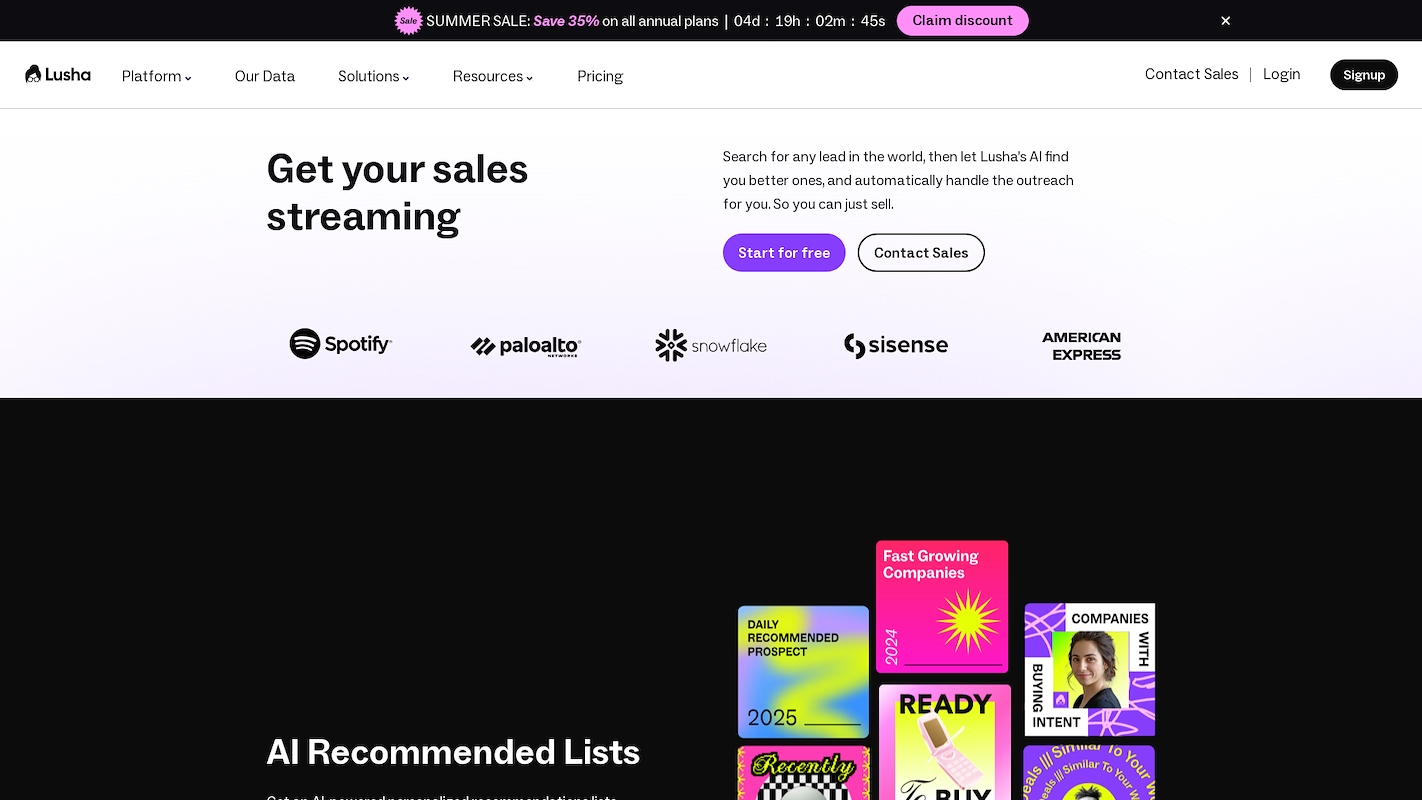
Lusha is a sales-intelligence platform for revenue teams to find global B2B leads. It uses AI to recommend prospects and automates outreach. The platform focuses on compliant data (GDPR, CCPA) and helps teams build lists, prioritize outreach with intent signals, and integrate with existing tools.
Lusha's Main Features
- Creates live, auto-updating lead lists that add new prospects at user-defined intervals.
- Identifies in-market buyers and sends real-time notifications based on intent triggers.
- Automates and personalizes email sequences using AI-generated copy.
- Records and analyzes sales meetings to provide insights.
How Lusha Compares to Ocean.io
Average Review score: 4.3/5 stars based on 1,516 G2 reviews.
- Lusha creates live lead lists that automatically update with new prospects. This is different from Ocean.io, which generates static lists of lookalike accounts based on an initial customer profile.
- The platform includes tools to automate and personalize email outreach sequences. This provides an engagement function that Ocean.io's platform, which centers on account discovery, does not offer.
- It offers transparent pricing with a free plan and paid tiers. This makes it more accessible for individuals or small teams compared to Ocean.io's custom-quote model, which is typically for larger enterprises.
- This tool identifies buyers who are actively in-market and sends real-time alerts. This use of intent data differs from Ocean.io's lookalike search, which finds similar companies based on a profile rather than on active buying signals.
Drawbacks Compared to Ocean.io
- Lusha does not have a direct equivalent to Ocean.io's AI-powered lookalike search. This feature in Ocean.io finds new companies that resemble your best customers, a function Lusha does not offer.
- The platform focuses on providing contact data for known targets. In contrast, Ocean.io's platform specializes in the initial discovery of new target accounts based on firmographic similarities.
- Some users note that for very specific niches, the broad data might be less targeted. Ocean.io's lookalike model may sometimes yield more relevant accounts for these specialized profiles.
Cost and Value Analysis
Lusha offers transparent pricing with a free plan and paid tiers starting at $36 per user. This contrasts with Ocean.io's custom-quote model, which is aimed at larger enterprises. Check the detailed pricing of Lusha on Lusha's official website.
4) Clearbit
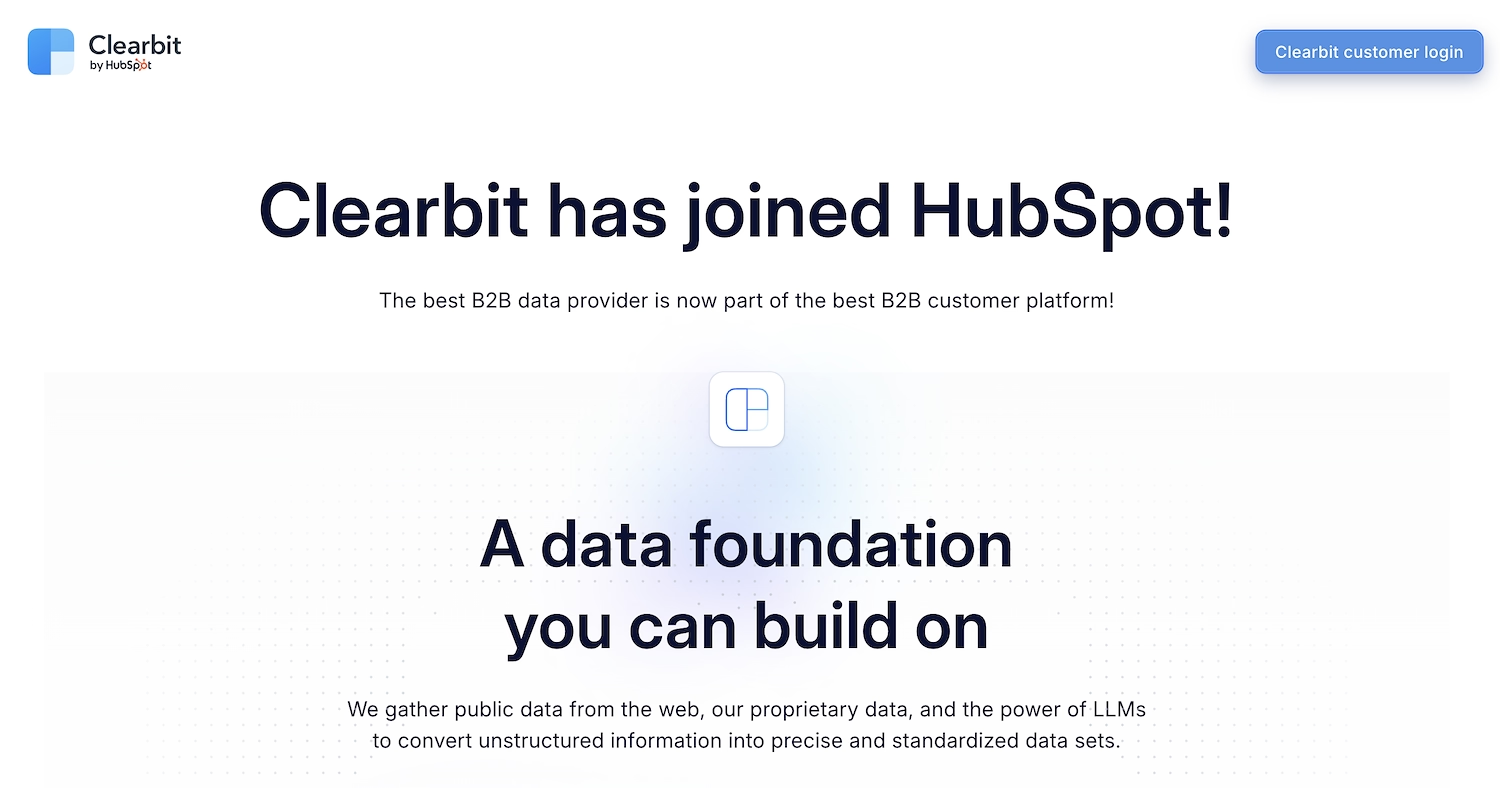
Clearbit is a marketing data engine for B2B companies. It offers a database with real-time company and contact information. Teams use this data to understand customers, find ideal prospects, and personalize interactions across the sales funnel.
The platform's data enrichment supports go-to-market strategies. It helps convert website visitors into qualified leads and provides a complete picture of a company's addressable market.
Clearbit's Main Features
- Adds firmographic and demographic details to every lead, contact, and account record.
- Provides data for real-time lead scoring and routing using industry classifications and corporate hierarchy.
- De-anonymizes website traffic to identify visiting companies that match the ideal customer profile.
- Removes form fields that can be automatically enriched, which reduces friction and boosts conversion.
How Clearbit Compares To Ocean.io
Average Review score: 4.4/5 stars based on 626 G2 reviews.
- Clearbit enriches existing lead records with over 100 data points in real time. This is different from Ocean.io, which focuses on generating lists of new lookalike accounts rather than enriching current contacts.
- It identifies anonymous companies visiting your website and turns them into leads. Ocean.io's platform centers on outbound prospecting, not on capturing this type of inbound interest.
- The tool shortens website forms by automatically enriching known fields, which can increase lead conversion rates. This is a marketing automation feature that Ocean.io does not offer.
- This platform provides data for real-time lead scoring and routing. This helps sales teams prioritize leads immediately, while Ocean.io provides a list of accounts that require further qualification.
Drawbacks Compared to Ocean.io
- Clearbit does not offer a direct equivalent to Ocean.io's AI-powered lookalike search. This makes the tool less suited to discover new companies that mirror your best customer profiles, as its primary function is data enrichment.
- The tool's main purpose is to enrich known leads and accounts with additional data. This differs from Ocean.io, which specializes in the initial discovery of entirely new target accounts based on firmographic similarities.
- Its platform is heavily geared towards inbound marketing and identifies anonymous website visitors. Teams focused purely on building outbound prospecting lists might find Ocean.io's account discovery model more direct for their needs.
Cost and Value Analysis
Clearbit operates on a custom-quote model and is considered a premium-priced solution, similar to Ocean.io. Neither platform provides public pricing. For the most accurate information, you will need to contact each vendor for a quote based on your needs; check the details on Clearbit's official website.
5) Cognism
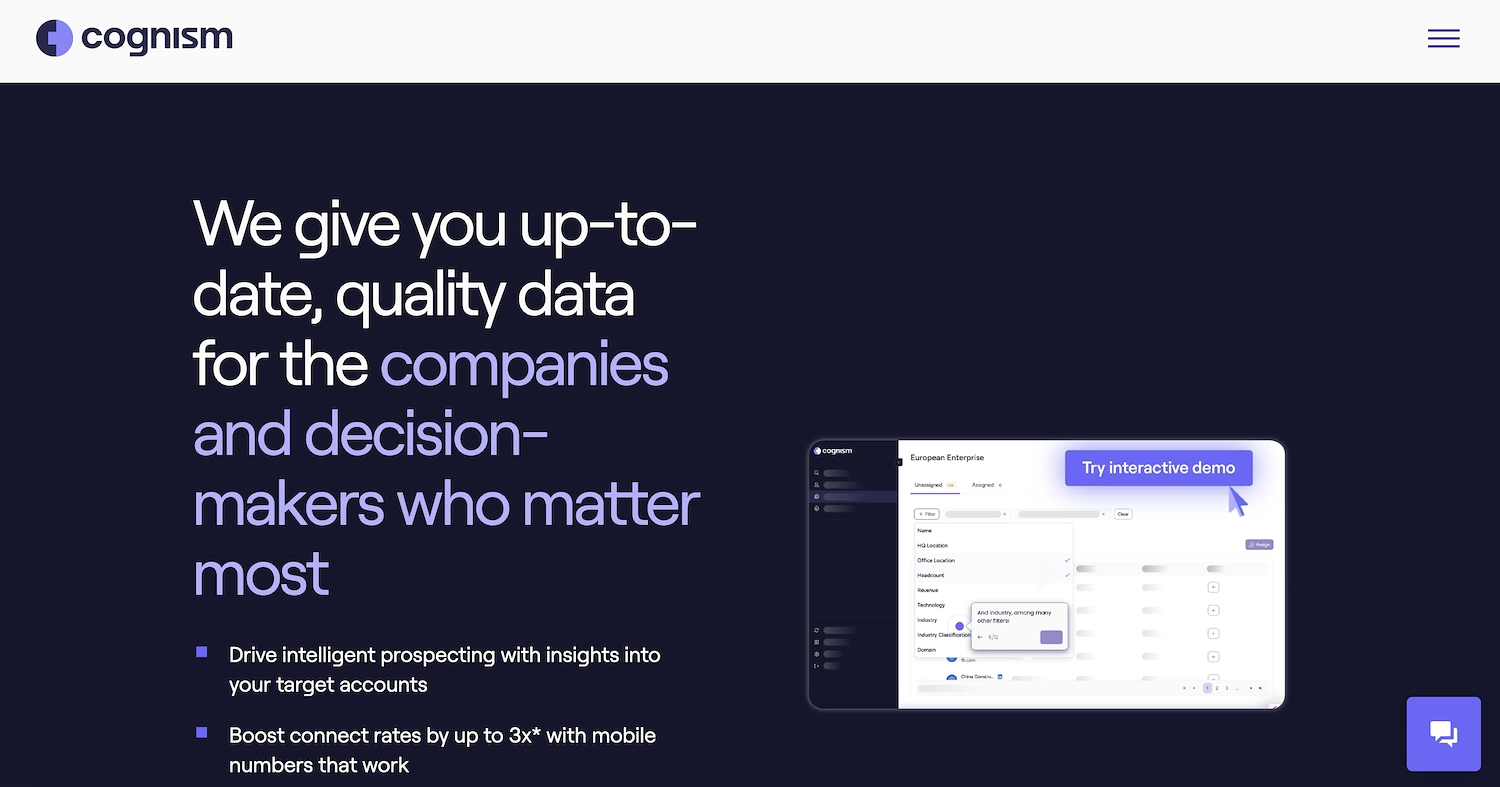
Cognism is a sales intelligence platform that provides compliant B2B data for go-to-market teams. It offers access to contact and company information, including mobile numbers and email addresses. Sales and marketing teams use the data to build prospect lists, enrich records, and identify decision-makers.
The database has global coverage and is verified to meet privacy laws like GDPR and CCPA. This focus on data compliance is a central aspect of the service.
Cognism's Main Features
- Provides phone-verified mobile numbers, called Diamond Data®, that are human-checked to increase connect rates.
- Surfaces buying signals from hiring trends, funding rounds, and technographic changes for timely outreach.
- Offers extensive coverage of mobile numbers and email addresses for contacts in the UK and EMEA.
- Includes a browser extension, Sales Companion, to prospect directly from LinkedIn and corporate websites.
How Cognism Compares to Ocean.io
Average Review score: 4.6/5 stars based on 1,033 G2 reviews.
- Cognism provides phone-verified mobile numbers, called Diamond Data®, which are human-checked for accuracy. This is different from Ocean.io, which focuses on identifying lookalike companies rather than providing direct contact details.
- It offers strong data coverage for the UK and EMEA regions, a core part of its service. Ocean.io's platform, in contrast, centers on its global lookalike search algorithm to find similar companies.
- The tool identifies buying signals like hiring trends and recent funding to find accounts ready to buy. This differs from Ocean.io's method, which finds new accounts based on firmographic similarities to a customer profile.
- Cognism includes a browser extension that allows prospecting directly from LinkedIn and company websites. This provides a workflow advantage over Ocean.io, which operates as a self-contained platform for account list generation.
Drawbacks Compared To Ocean.io
- Cognism does not offer a direct equivalent to Ocean.io's AI-powered lookalike search. This makes the tool less suited for the discovery of new companies that mirror your best customer profiles.
- Its platform is primarily for providing contact data for known targets. This differs from Ocean.io, which specializes in the initial discovery of new target accounts based on firmographic similarities.
- For very specific niches, some users note its broad data can be less targeted. In contrast, Ocean.io's lookalike model may yield more relevant accounts because it analyzes your existing customer base.
Cost and Value Analysis
Cognism operates on a custom-quote model and is considered a premium-priced solution, similar to Ocean.io. For exact pricing, you will need to contact each vendor for a quote based on your needs. For more details, you can visit Cognism's official website.
Consider 11x for Autonomous Sales
The alternatives above offer strong data and engagement features. If your goal is to augment your team with autonomous agents instead, 11x presents a different model for pipeline growth.
Their digital workers handle the full sales cycle, from prospect discovery to outreach. This approach is for teams that want to automate sales operations rather than just equip them with data tools.
To see how AI agents can manage your sales process, you can book a demo with 11x.
With 11x, we use AI to run your sales playbook. Alice finds accounts, enriches their data, and manages outreach, while Julian handles calls, qualifies prospects, and schedules meetings. Our platform consolidates tools for intent signals and email warmup, replacing multiple GTM solutions.
Book a demo to see it in action.
6) Seamless.AI
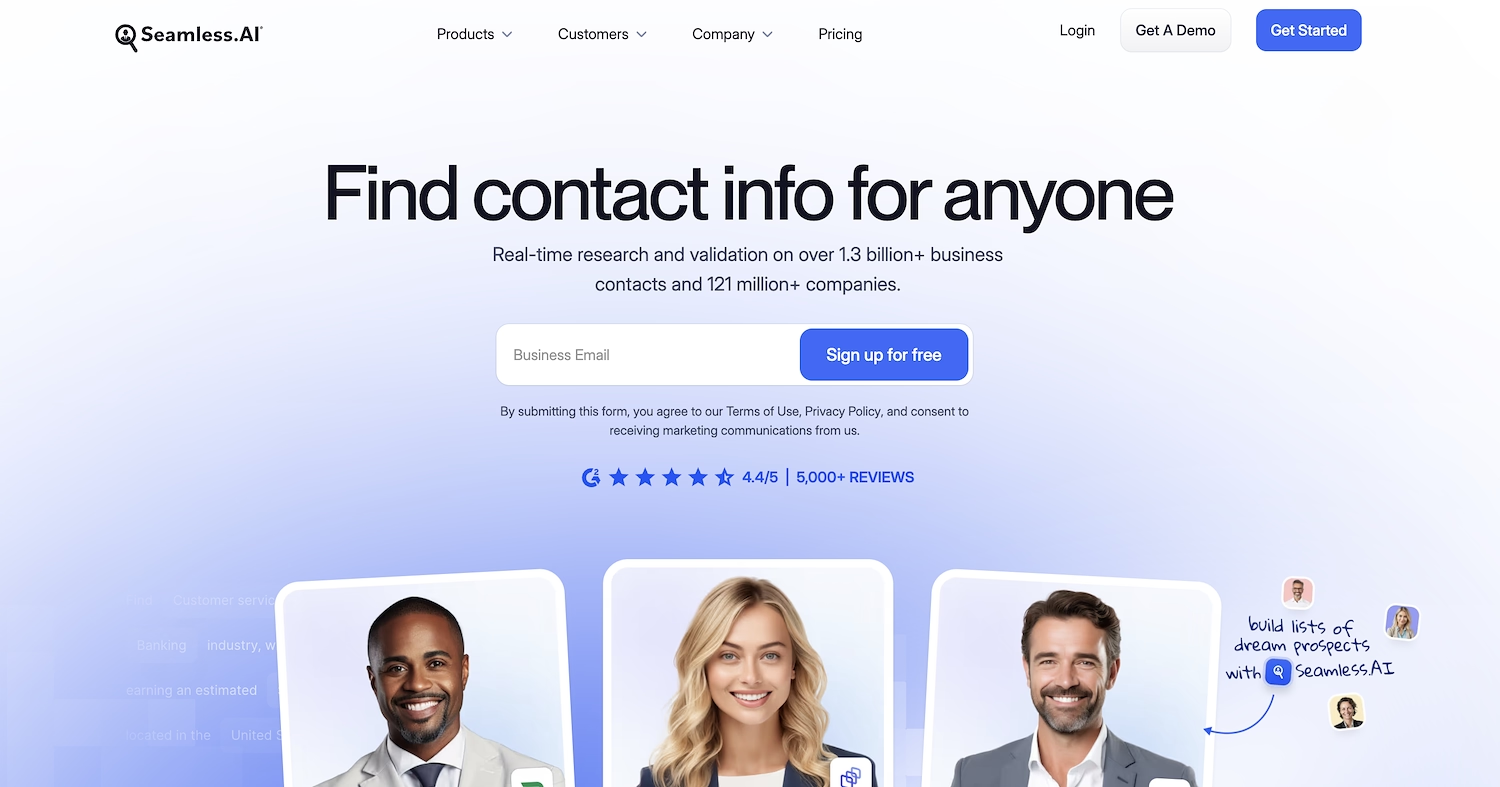
Seamless.AI is a sales intelligence platform that functions as a real-time search engine for B2B data. It provides access to a database of contact and company information. Teams use it to find verified phone numbers and email addresses for their target accounts.
The main use case is to build prospect lists. Sales professionals can connect directly with decision-makers, which can shorten the sales cycle. The platform's data covers a wide range of industries and supports various go-to-market strategies.
Seamless.AI's Main Features
- Identifies prospects who are ready to buy using buyer intent data.
- Monitors job changes for customers and prospects and automatically provides updated contact information.
- Generates research and personalized messages for outreach with its AI pitch intelligence.
- Automates the list-building process to maintain a consistently full sales pipeline.
How Seamless.AI Compares to Ocean.io
Average Review score: 4.4/5 stars based on 5,067 G2 reviews.
- Seamless.AI functions as a real-time search engine for B2B contact data. This is different from Ocean.io, which generates static lists of lookalike companies based on a customer profile.
- The platform uses buyer intent data to identify prospects who are ready to buy. This provides a different approach than Ocean.io's lookalike search, which finds similar companies based on firmographics.
- It tracks job changes for contacts and automatically updates their information. This helps maintain data accuracy over time, a feature not present in Ocean.io's account discovery platform.
- This tool includes an AI feature that helps write personalized outreach messages. Ocean.io's AI, in contrast, focuses on its lookalike search to find new target accounts.
Drawbacks Compared To Ocean.io
- Seamless.AI does not offer a direct equivalent to Ocean.io's AI-powered lookalike search. This makes the tool less suited to discover new companies that mirror your best customer profiles, as its primary function is to find contact data.
- The platform's main purpose is to provide contact information for known targets. This differs from Ocean.io, which specializes in the initial discovery of new target accounts based on firmographic similarities.
- For very specific niches, some users note its broad data can be less targeted. In contrast, Ocean.io's lookalike model may yield more relevant accounts because it analyzes your existing customer base.
Cost and Value Analysis
Seamless.AI offers a free plan and uses a custom-quote model for its paid tiers, which is similar to Ocean.io's premium pricing. While both are significant investments, Seamless.AI provides an entry point with free credits. For exact costs, you will need to contact each vendor for a quote.
7) UpLead
UpLead is a B2B prospecting platform that provides contact and company data. It focuses on data accuracy with a 95% guarantee. Teams use it to build targeted prospect lists with verified information, which helps them connect with relevant decision-makers.
UpLead's Main Features
- Offers a 95% data accuracy guarantee on its contact and company information.
- Verifies email addresses in real time at the point of export to ensure deliverability.
- Provides technographic data to identify prospects based on the technology they use.
- Includes intent data to find companies that show purchase signals for specific products.
How UpLead Compares to Ocean.io
Average Review score: 4.7/5 stars based on 1,611 G2 reviews.
- UpLead offers a 95% data accuracy guarantee, a specific commitment not found in Ocean.io's model. Ocean.io focuses on the relevance of its lookalike account suggestions rather than a contact data accuracy metric.
- It provides real-time email verification upon data export. This feature supports data hygiene, a different focus from Ocean.io's core function of account discovery.
- The platform includes intent data to identify companies with active buying signals. This contrasts with Ocean.io's lookalike search, which finds similar companies based on firmographic profiles.
- UpLead has transparent, credit-based pricing tiers. This makes it accessible for different budgets, while Ocean.io operates on a custom-quote model aimed at enterprise clients.
Drawbacks Compared to Ocean.io
- UpLead does not have a direct equivalent to Ocean.io's AI-powered lookalike search. Its strength is to find contacts within defined criteria, not to discover new company profiles based on an existing customer list.
- The platform is built to execute a search for known prospect profiles. Teams that want to discover entirely new market segments may find Ocean.io's approach more suitable for that specific task.
- Some users may find the credit-based system restrictive for large-scale data exploration. Ocean.io's model, while custom, might offer more flexibility for its specific account discovery function, depending on the contract terms.
Cost and Value Analysis
UpLead offers transparent pricing with a free trial and paid plans that start at $74 per month. This credit-based model provides flexibility for various team sizes. In contrast, Ocean.io uses a custom-quote model, which positions it as a premium solution for larger organizations.
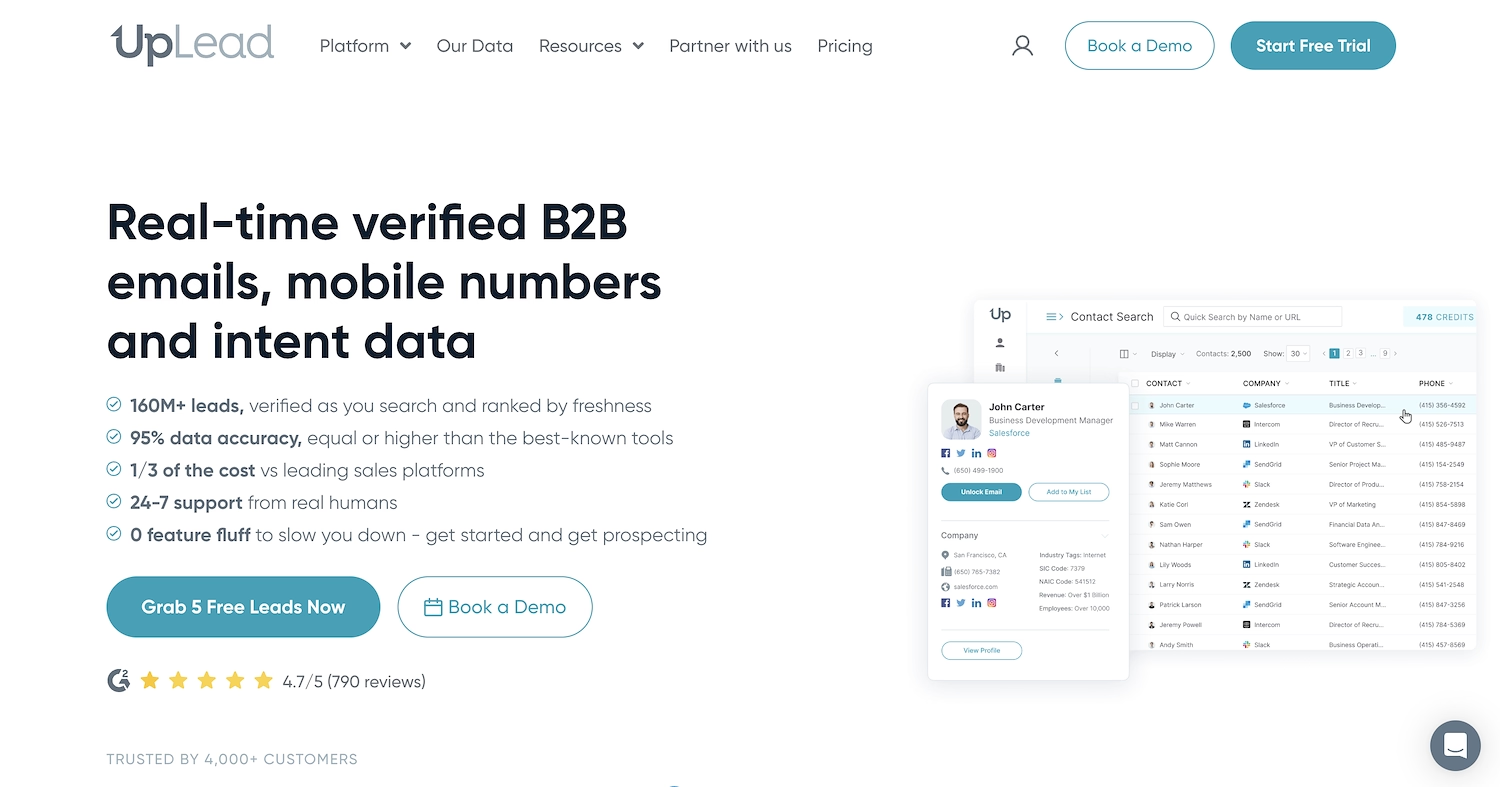
UpLead is a B2B data platform that provides contact and company information with a 95% accuracy guarantee. Teams use its verified data to build targeted prospect lists and connect with decision-makers.
UpLead's Main Features
- Builds targeted lists in real time using over 50 search filters.
- Pulls more than 40 data points for thousands of leads in a single bulk action.
- Enriches and syncs CRM records live to prevent data from becoming stale.
- Provides access to mobile and direct office phone numbers for contacts.
How UpLead Compares To Ocean.io
Average Review score: 4.7/5 stars based on 797 G2 reviews.
- UpLead offers a 95% data accuracy guarantee. This specific commitment differs from Ocean.io, which focuses on the relevance of its lookalike suggestions.
- It provides real-time email verification at the point of export. This data hygiene feature is not central to Ocean.io's account discovery model.
- The platform includes intent data to find companies with active purchase signals. This contrasts with Ocean.io's firmographic-based lookalike search.
- This tool has transparent, credit-based pricing tiers. This makes it accessible for various budgets, while Ocean.io uses a custom-quote model.
Drawbacks Compared To Ocean.io
- UpLead finds prospects based on specific search filters like industry or location. It does not offer a feature similar to Ocean.io's AI lookalike search, which automatically finds new companies that resemble your best customers.
- The platform works well when a team has a defined ideal customer profile. For discovering entirely new market segments, Ocean.io's approach of analyzing an existing customer base to find similar accounts might be more direct.
- Its credit-based pricing model provides cost control for targeted searches. However, some teams might find this system restrictive for very large-scale data exploration compared to Ocean.io's custom plan for its account discovery function.
Cost and Value Analysis
UpLead offers a free trial and transparent, credit-based pricing with paid plans starting at $99 per month. In contrast, Ocean.io uses a custom-quote model aimed at larger enterprises, making UpLead a more accessible option for teams that need predictable costs.
8) SalesIntel
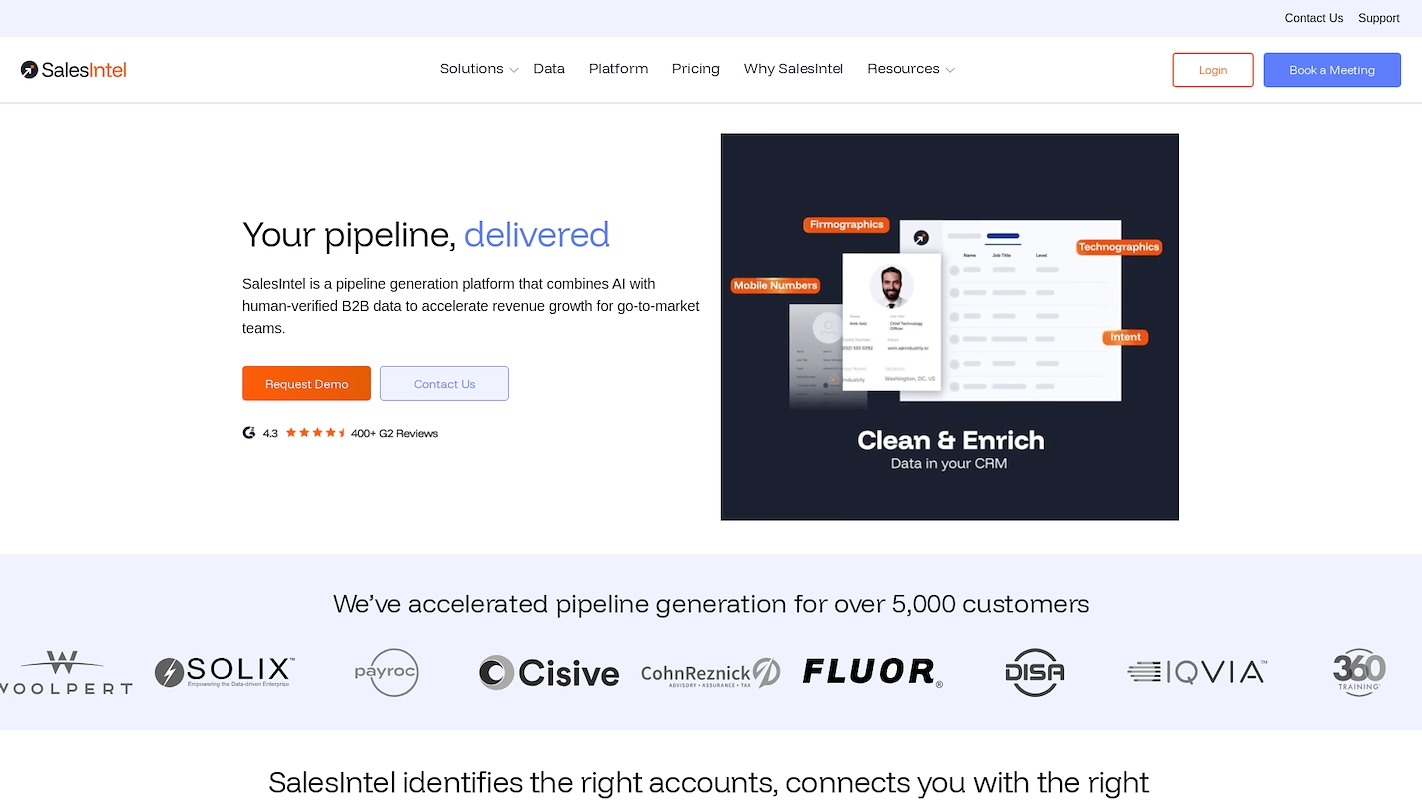
SalesIntel is a sales intelligence platform that provides B2B contact and company data for go-to-market teams. The service is used to build prospect lists, identify decision-makers, and enrich account records. It focuses on data accuracy to help sales and marketing professionals connect with contacts inside their target companies.
SalesIntel's Main Features
- Offers both human- and machine-verified contacts with a 90-day data refresh cycle.
- Finds in-market buyers using real-time intent, firmographic, and technographic data signals.
- Enriches CRM and marketing automation tools with unlimited credits to maintain data accuracy.
- Builds dynamic ideal customer profiles to power automated campaigns and programmatic ads.
How SalesIntel Compares To Ocean.io
Average Review score: 4.3/5 stars based on 462 G2 reviews.
- SalesIntel provides human-verified contact data that is refreshed every 90 days. This focus on accuracy is different from Ocean.io, which centers on discovering lookalike companies rather than verifying individual contact details.
- The platform identifies companies that show active buying signals through its intent data. This is a different approach compared to Ocean.io, which finds new accounts based on firmographic similarities to existing customers.
- It offers unlimited credits for data enrichment to keep CRM records current. This function supports data maintenance, while Ocean.io's platform is built for the initial discovery of new accounts.
- This tool helps build dynamic ideal customer profiles for automated campaigns. This is different from Ocean.io, which generates a static list of lookalike accounts from a single profile analysis.
Drawbacks Compared To Ocean.io
- SalesIntel does not offer a direct equivalent to Ocean.io's AI-powered lookalike search. This makes the tool less suited to discover new companies that mirror your best customer profiles.
- The platform's main purpose is to provide contact information for known targets. This differs from Ocean.io, which specializes in the initial discovery of new target accounts based on firmographic similarities.
- For very specific niches, some users note its broad data can be less targeted. In contrast, Ocean.io's lookalike model may yield more relevant accounts because it analyzes your existing customer base.
Cost and Value Analysis
SalesIntel operates on a custom-quote model and is considered a premium-priced solution, similar to Ocean.io. While SalesIntel offers a free trial, you will need to contact both vendors for exact pricing. For more details, visit SalesIntel's official website.
9) LeadIQ
LeadIQ is a prospecting platform for sales teams to find and capture contact information. It speeds up lead list creation by gathering data directly from social profiles and company websites.
LeadIQ's Main Features
- Captures contact data from LinkedIn and other websites with a browser extension.
- Verifies email addresses to reduce bounce rates.
- Integrates with CRM and sales engagement platforms to sync prospect data.
- Tracks job changes to help maintain contact with previous buyers.
How LeadIQ Compares to Ocean.io
Average Review score: 4.2/5 stars based on 638 G2 reviews.
- LeadIQ captures contact data for individual prospects, often via a browser extension. Ocean.io's platform is built to discover new companies that match a specific customer profile.
- The platform's workflow supports real-time prospect searches on websites like LinkedIn. This is different from Ocean.io, which generates a static list of lookalike accounts based on an initial analysis.
- It offers transparent pricing plans, including a free tier. This makes it accessible for individuals and small teams, while Ocean.io uses a custom-quote model aimed at larger enterprises.
- This tool helps find contact details for people at target companies. Ocean.io's main function is to identify the target companies themselves.
Drawbacks Compared to Ocean.io
- LeadIQ does not have a direct equivalent to Ocean.io's AI-powered lookalike search. Its function is to find contact data for defined targets, not to discover new, similar companies automatically.
- The platform is centered on contact acquisition rather than strategic account discovery. Teams focused on high-level market analysis may find Ocean.io's account-centric model more aligned with their goals.
- Some users note that data accuracy for certain contacts can vary. In contrast, Ocean.io's value is in the relevance of its company suggestions, a different type of data quality.
Cost and Value Analysis
LeadIQ provides transparent pricing with a free plan and paid tiers starting around $39 per user. This makes it an accessible option for teams of various sizes. Ocean.io uses a custom-quote model, positioning it as a premium solution for larger organizations.
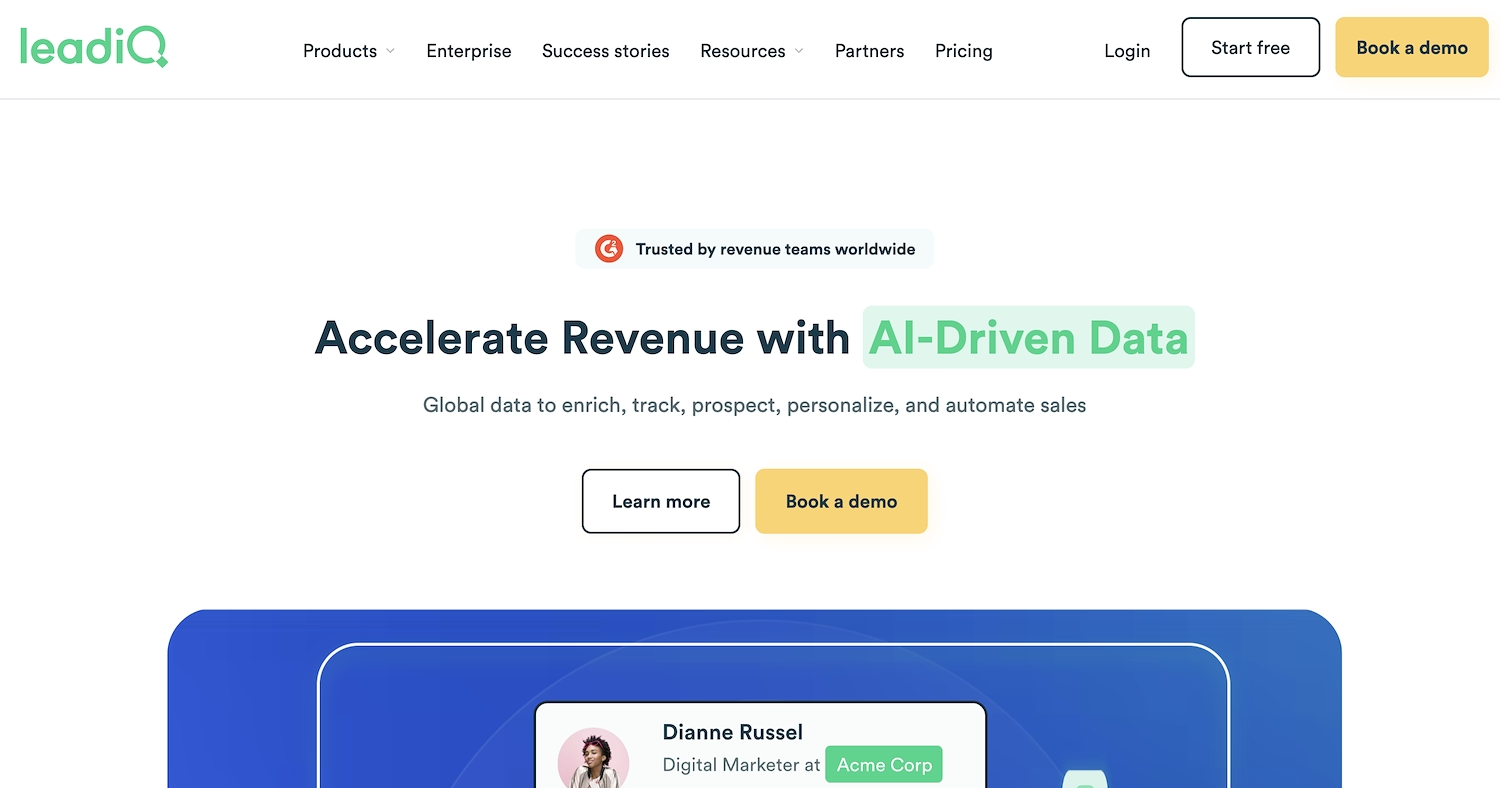
LeadIQ is a prospecting platform for sales teams to find and capture contact information. It helps create lead lists with data from social profiles and company websites. The platform uses a browser extension to collect contact details and verifies email addresses to reduce bounce rates.
It also syncs prospect data with a CRM and tracks job changes. This helps sales teams maintain contact with previous buyers.
LeadIQ's Main Features
- Captures contact data from social profiles and company websites using a browser extension.
- Tracks sales triggers, including job changes, to provide timely outreach opportunities.
- Personalizes cold outreach with an AI writing assistant.
- Integrates with CRM and sales engagement platforms to sync prospect data.
How LeadIQ Compares To Ocean.io
Average Review score: 4.2/5 stars based on 1,097 G2 reviews.
- LeadIQ captures contact data for individual prospects with a browser extension, which is different from Ocean.io's focus on discovering new companies.
- The platform includes an AI writing assistant to help personalize outreach messages, whereas Ocean.io uses its AI to find lookalike companies.
- It tracks sales triggers like job changes to provide timely outreach opportunities, while Ocean.io's platform generates a static list of accounts.
- This tool's workflow supports real-time prospect searches on social profiles, which differs from Ocean.io's method of providing a pre-generated list.
- LeadIQ offers transparent pricing with a free plan, making it more accessible than Ocean.io's custom-quote model for enterprises.
Drawbacks Compared To Ocean.io
- LeadIQ does not offer a direct equivalent to Ocean.io's AI-powered lookalike search. Its platform helps find contact data for known targets, not discover new, similar companies automatically.
- The platform centers on contact acquisition instead of strategic account discovery. Teams that focus on high-level market analysis may find Ocean.io's account-centric model more suitable for their goals.
- Some users note that data accuracy for individual contacts can vary. This is different from Ocean.io, where the value is in the relevance of its company suggestions, not specific contact details.
Cost and Value Analysis
LeadIQ provides transparent pricing with a free plan and paid tiers starting at $45 per user, making it an accessible option for teams of various sizes. In contrast, Ocean.io uses a custom-quote model, positioning it as a premium solution for larger organizations.
10) LinkedIn Sales Navigator
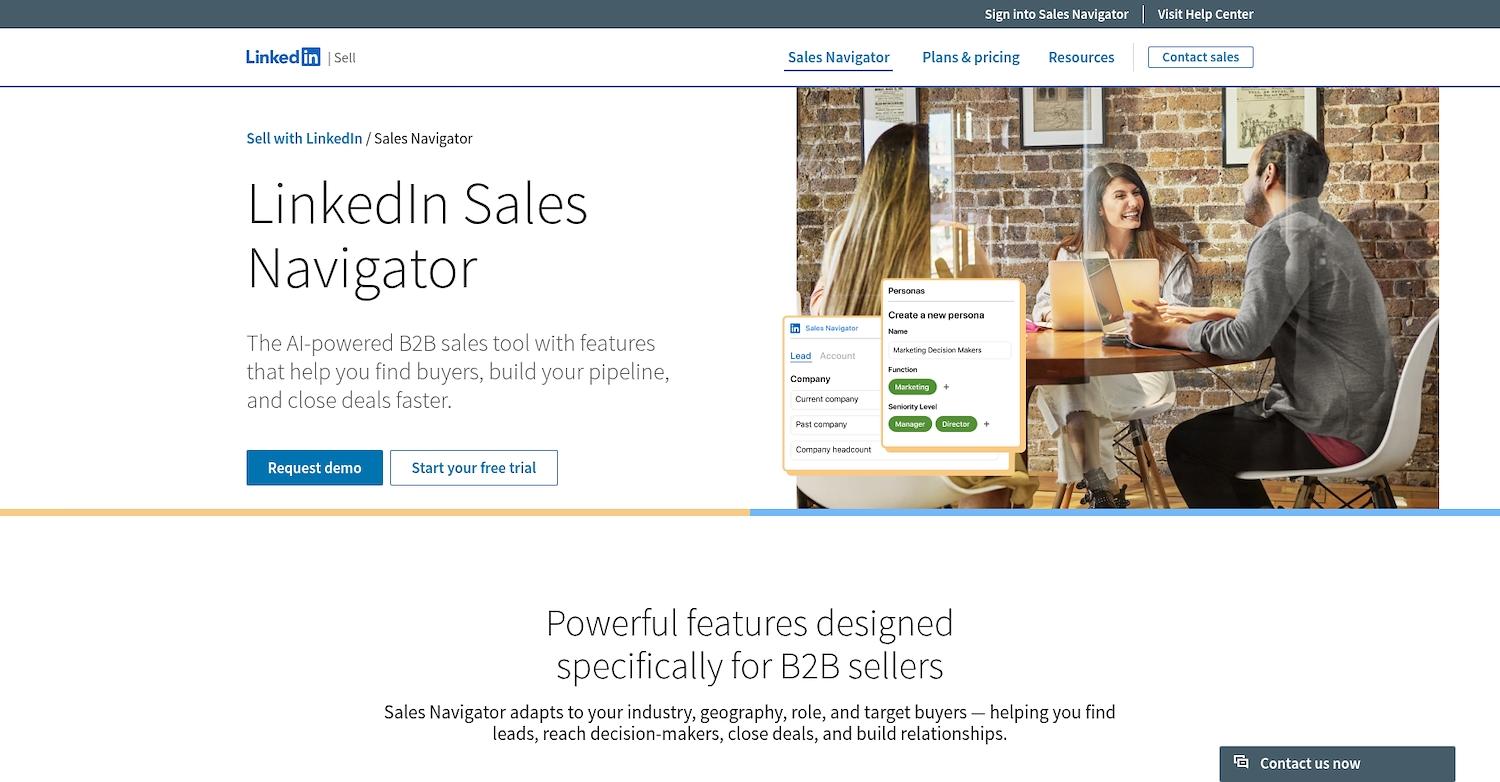
LinkedIn Sales Navigator is a sales tool that uses the LinkedIn professional network. Sales teams use it to find decision-makers and create lead lists. The platform offers search filters and account insights to identify prospects.
Its database consists of self-reported data from millions of user profiles. This provides a unique source of B2B contacts and company information for sales outreach and account research.
LinkedIn Sales Navigator's Main Features
- Uses a lead builder tool to create and manage prospect lists.
- Integrates with CRM and marketing automation platforms to sync data.
- Offers data segmentation and filtering to target specific contacts and companies.
- Provides user, role, and access management to control team usage.
How LinkedIn Sales Navigator Compares To Ocean.io
Average Review score: 4.3/5 stars based on 1,990 G2 reviews.
- LinkedIn Sales Navigator uses data from its network of over 860 million professionals. This provides a vast pool of self-reported information, while Ocean.io's platform generates company lists based on its lookalike algorithm.
- It offers advanced search filters to find specific decision-makers within target companies. This is a more granular approach than Ocean.io's, which identifies lookalike companies at an organizational level.
- The tool integrates with CRM platforms to sync prospect data. This is different from Ocean.io's process, which centers on generating a list of target accounts rather than syncing individual lead data.
- Sales Navigator helps users find and connect with individual professionals. Ocean.io's platform, in contrast, is designed to discover new companies that resemble a firmographic profile.
Drawbacks Compared To Ocean.io
- LinkedIn Sales Navigator lacks a direct equivalent to Ocean.io's AI-powered lookalike search. This means users must manually define search criteria, while Ocean.io automatically discovers new accounts based on a profile of your best customers.
- The platform focuses on finding contacts within a defined target account list. This is different from Ocean.io, which specializes in the initial discovery of new companies, potentially uncovering markets you had not considered.
- Some users note that relying on self-reported profile data can occasionally lead to outdated information. Ocean.io's approach is different; it analyzes firmographic data to determine company similarity, rather than relying on individual user updates.
Cost and Value Analysis
LinkedIn Sales Navigator has public pricing, while Ocean.io operates on a custom-quote model. Both are premium tools, but Sales Navigator offers more transparent pricing. For exact costs, contact Ocean.io for a quote and consult the Sales Navigator website.
Which One Should You Go With?
Choosing the right Ocean.io alternative depends on your specific sales process and goals. This guide analyzed the top options to help you create a shortlist for further review.
If your goal is to automate sales operations rather than just acquire data, 11x offers a different approach. Its AI agents manage the entire sales process, from finding prospects to outreach, augmenting your team with autonomous digital workers.




